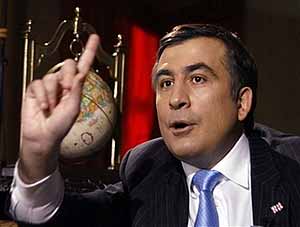January 07, 2008 (the date of publication in Russian)
Yegor Bulatov
GEORGIA: GUNS INSTEAD OF BUTTER
The Tbilisi ballot is enough doubtful to inspire Mikhail Saakashvili for a military crackdown on breakaway autonomies
 Though the State Election Commission of Georgia spent many days counting the votes cast on January 5, the official result was predetermined. Incumbent President Mikhail Saakashvili, a postgraduate of Columbia University and a once hero of the Georgian "revolution of roses", declared himself the winner, claiming that the second round of elections was not needed as his advantage exceeded 50 per cent. The official data of the Election Commission tallied with this statement: Saakashvili was reported to have gained 52% of the vote, while his major opponent, businessman Levan Gachicheladze, allegedly garnered not more than a half of this amount. These numbers blatantly contrasted with the results of exit polls, collected by observers from a friendly Ukraine.
Though the State Election Commission of Georgia spent many days counting the votes cast on January 5, the official result was predetermined. Incumbent President Mikhail Saakashvili, a postgraduate of Columbia University and a once hero of the Georgian "revolution of roses", declared himself the winner, claiming that the second round of elections was not needed as his advantage exceeded 50 per cent. The official data of the Election Commission tallied with this statement: Saakashvili was reported to have gained 52% of the vote, while his major opponent, businessman Levan Gachicheladze, allegedly garnered not more than a half of this amount. These numbers blatantly contrasted with the results of exit polls, collected by observers from a friendly Ukraine.
The opposition insists that the official results are illegitimate, pointing out a multitude of illegitimate means used by Saakashvili's team to guarantee his advantage, ranging from pressure on the rivals to massive ballot-rigging. The high possibility of falsification is obvious at least from the fact that the number of voters exceeded the official number of Georgian nationals by 1mln. Observers from OSCE and PACE, who overlooked this discordance and declared on January 6 that the elections corresponded with democratic standards, are believed by the Georgian opposition to be politically biased. Meanwhile, observers from Russia pointed out that their European colleagues abstained from traveling to remote rural districts of Georgia where the ballot was most questionable.
Russia's Ministry of Foreign Affairs, in its official statement released on January 6, indicated that the election campaign in Georgia had actually started in the conditions of a state of emergency; that the Presidential race was marked with an excessive use of the fabulous "administrative resource" (for what Russia is regularly blamed); that oppositionist candidates, as well as the Saakashvili-disloyal media and business circles underwent overt pressure.
While Saakashvili is receiving official congratulations from many heads of states – including Kazakhstan that seeks increase of fuel exports across the Georgian territory – the opposition is drumming up protesters. Though the prospect of the oppositionist upsurge is vague, the official 52% result of the vote obviously restricts the capabilities of the incumbent leadership. In order to consolidate his power, Saakashvili needs to undertake some additional political measures, as well as to provide additional evidence of his loyalty to Western patrons.
The latter requirement was supposed to be satisfied with the results of the referendum on Georgia's entry in the North Atlantic Alliance, intentionally arranged on the day of the Presidential elections. The result of this vote, displaying a convincing figure of 60% NATO-sympathizers, looks far from plausible. For instance, Georgia's entry in NATO is allegedly greeted by 99 per cent of the Georgian diaspora in Russia, while the number of Georgian nationals, residing in Moscow, is estimated in only 333 persons – an unbelievably small quantity.
Saakashvili's focus on Georgia's military policy reveals his post-election intentions. The prospect of membership in NATO is related to the country's integrity. Meanwhile, Abkhazia and South Ossetia, which had been part of the Georgian Soviet Socialist Republic, have efficiently separated from Georgia, though not being politically recognized by the world community. The two breakaway republics abstained from participation in the elections as well, as an overwhelming majority of the population of both had long renounced Georgian citizenship.
Mikhail Saakashvili has been promising to reintegrate his country since his ascent to power. Similarly, he promised to lead his nation into NATO, enjoying verbal approval from the sympathetic US Administration and enthusiastically displaying his devotion to American geopolitical goals by dispatching soldiers to Iraq and Afghanistan. However, Washington's unilateral attempt to arrange Georgia's entry in NATO is likely to encounter unvoiced sabotage from European allies.
Georgia's itch for entry in NATO membership does not gain much enthusiasm among West European states that have long expressed their disaccord with US military policy, particularly in Iraq. “Old Europe” has got enough problems with other post-Communist champions of loyalty to Washington. In any case, the final decision depends on the view of NATO's majority and not on the will of Mr. Saakashvili or even of the whole of his crumbling nation.
On the contrary, the decision to invade Abkhazia and South Ossetia is up to Saakashvili who may hope for political consolidation of Georgia as well as for a new rise of his personal popularity that would ensue from a supposed military success.
Thus, the major intrigue of the Georgian presidential elections is not in the outcome of the brawl over the ballot but rather in Saakashvili's subsequent plans regarding the breakaway territories. The timing of the assault on Abkhazia and Southern Ossetia is most likely to coincide with the transition of power in Moscow.
Number of shows: 1293
 ENG
ENG 

 ENG
ENG 
